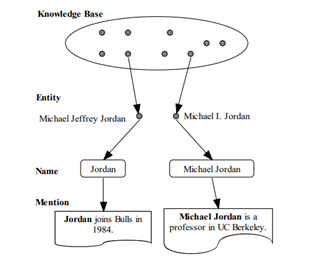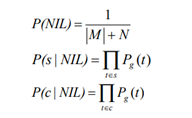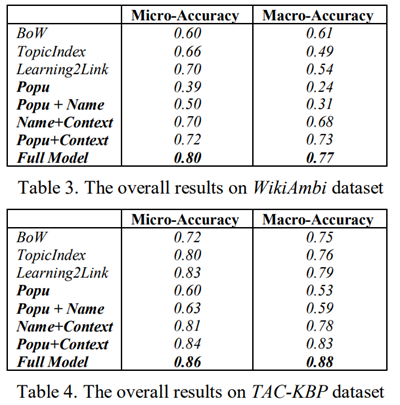论文《A Generative Entity-Mention Model for Linking Entities with Knowledge Base》
A Generative Entity-Mention Model for Linking Entities with Knowledge Base
一.主要方法
提出了一种生成概率模型,叫做entity-mention model.
Explanation:
In our model, each name mention to be linked is modeled as a sample generated through a three-step generative story, and the entity knowledge is encoded in the distribution of entities in document P(e), the distribution of possible names of a specific entity P(s|e), and the distribution of possible contexts of a specific entity P(c|e). To find the referent entity of a name mention, our method combines the evidences from all the three distributions P(e), P(s|e) and P(c|e).
The P(e), P(s|e) and P(c|e) are respectively called the entity popularity model, the entity name model and the entity context model
二.相关介绍
建模
Given a set of name mentions M = {m1, m2, …, mk} contained in documents and a knowledge base KB containing a set of entities E = {e1, e2, …, en}, an entity linking system is a function s : M ® E which links these name mentions to their referent entities in KB.
Popularity Knowledge
实体的流行度知识告诉我们一个实体出现在文档中的可能性
Name Knowledge
名称知识告诉我们实体的可能名称,以及名称引用特定实体的可能性。
Context Knowledge
上下文知识告诉我们一个实体出现在特定上下文中的可能性。
三.The Generative Entity-Mention Model for Entity Linking
Explanation

- 首先,该模型根据P(e)中实体的分布情况,从给定知识库中选择提及名称的引用实体e。
- 其次,该模型根据被引用实体P(s|e)的可能名称的分布情况输出所述名称的名称s。
- 最后,模型根据被引用实体P(c|e)可能的上下文分布输出所提到的名称的上下文c。
model
The probability of a name mention m (its context is c and its name is s) referring to a specific entity e can be expressed as the following formula (here assume that s and c are independent):

Give a name mention m, to perform entity linking, we need to find the entity e which maximizes the probability P(e|m).

Candidate Selection
building a name-to-entity dictionary using the redirect links, disambiguation pages, anchor texts of Wikipedia, then the candidate entities of a name mention are selected by finding its name’s corresponding entry in the dictionary
四.Model Estimation
Entity Popularity Model
 ----》
----》
where Count(e) is the count of the name mentions whose referent entity is e, and the |M| is the total name mention size.
Entity Name Model
比如,我们希望 P(Michael Jordan|Michael Jeffrey Jordan) 高,,P(MJ|Michael Jeffrey Jordan) 也高。 P(Michael I. Jordan|Michael Jeffrey Jordan) 应该是0.
因此,名称模型可以通过首先从数据集中收集所有(实体、名称)对来估计。

缺点:它不能正确地处理一个不可见的实体或一个不可见的名称。
Eg: “MJ”在Wikipedia指的并不是Michael Jeffrey Jordan, 这个the name model 将不能识别 “MJ” 就是Michael Jeffrey Jordan.
↓
1) It is retained (translated into itself);
2) It is translated into its acronym;
3) It is omitted(translated into the word NULL);
4) It is translated into another word (misspelling or alias).


wheree is a normalization factor, f is the full name of entity e, lf is the length of f, ls is the length of the name s, si the i th word of s, fj is the j th word of f and t(si|fj) is the lexical translation probability which indicates the probability of a word fj in the full name will be written as si in the output name.
Entity Context Model
例如:
C1: __wins NBA MVP.
C2: __is a researcher in machine learning
P(C1|Michael Jeffrey Jordan)应该很高,因为NBA球员迈克尔杰弗里乔丹经常出现在C1和P(C2|Michael Jeffrey Jordan)应该是非常低的,因为他很少出现在C2.
a context c containing n terms t1,t2…tn (term: a word; a named entity; a Wikipedia concept) ,the entity context model estimates the probability P(c|e) as


where Pg(t) is a general language model which is estimated using the whole Wikipedia data, and the optimal value of λ is set to 0.2

where Counte(t) is the frequency of occurrences of a term t in the contexts of the name mentions whose referent entity is e
The NIL Entity Problem
假设:“如果一个名字被提到是指一个特定的实体,那么这个名字被提到的概率是由特定实体的模型产生的,应该显著高于由一般语言模型产生的概率
1. add a pseudo entity, the NIL entity, into the knowledge base
2. the probability of a name mention is generated by the NIL entity is higher than all other entities in Knowledge base, we link the name mention to the NIL entity.

五.Experiments





 浙公网安备 33010602011771号
浙公网安备 33010602011771号